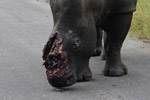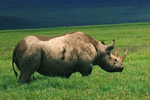WARNING: graphic image below.
Poachers have butchered 558 rhinos in South Africa so far this year, approximately a hundred more animals than lost during the same time in 2013.
Last year set a bloody record for rhino poaching in the country, which houses around 75 percent of the world’s total rhino population, with 1,004 killed. Yet, if this year’s current trend continues for the second half of 2014, the country could exceed that number by over 100 animals.
The country’s biggest protected area, Kruger National Park, remains the hardest hit by poachers. To date, about 62 percent of the rhinos killed in the country were poached in Kruger.
Rhinos are being poached for their horn, which is sawn off, ground into a powder, and consumed in places like Vietnam and China as a status symbol and a curative. This despite the fact that there is no evidence rhino horn curing anything, and, given that it’s made almost entirely of keratin, scientists have likened it to eating your fingernails. Still, rhino horn has become more valuable than gold and cocaine in recent years as there has been a surge of demand for the illicit product.
Of the world’s five rhino species, three are currently listed as Critically Endangered and two of these aredown to less than 100 animals. South Africa is home to the world’s most abundant rhino species: the white rhino (Ceratotherium simum), which is listed as Near Threatened by the IUCN Red List. The country also houses the Critically Endangered black rhino (Diceros bicornis), albeit in much smaller populations.

One of this year’s victims of poaching in South Africa. A young male rhino whose horn and part of its face was cut off by poachers. The animal survived for several days before South African officials found it and put it down. Photo by: Frans Lombard, shared on Facebook.
Related articles
U.S should sanction Mozambique for its role in elephant, rhino poaching, urges NGOs
(07/03/2014) Two prominent NGOs U.S should sanction Mozambique for its role in elephant, rhino poaching, urges NGOsare petitioning the U.S government to slap Mozambique with trade sanctions due to the country’s role in regional poaching. The groups contend that Mozambique has done little to combat both its own poaching epidemic or stop its nationals from spilling over the border to kill rhinos and elephants in South Africa and Tanzania.
Despite poaching, Indian rhino population jumps by 27 percent in eight years
(06/10/2014) The world’s stronghold for Indian rhinos—the state of Assam—has seen its population leap by 27 percent since 2006, despite a worsening epidemic of poaching that has also seen 156 rhinos killed during the same period. According to a new white paper, the population of Indian rhinos in Assam hit 2,544 this year.
Howard G. Buffett puts $24M toward saving rhinos
(03/21/2014) Howard G. Buffett, the son of Berkshire Hathaway chairman Warren Buffett, has pledged $23.7 million to South African National Parks to help fight rhino poaching in Kruger National Park, reports Reuters.
Rhino with bullet in its brain and hacked off horn wanders for days before being put down

(03/05/2014) Last week, visitors in Kruger National Park came on a horrifying sight of the poaching trade: a rhino, still alive, with its horn and part of its face chopped off. The gruesome photo of the young rhino went viral and sent South African authorities scrambling. Five days after the sighting, South African National Parks (SANParks) has announced they found the rhino and put it out of its misery.
Javan rhino population jumps by over 10 percent
(03/04/2014) The Javan rhino population has increased by over ten percent from 2012 to last year, according to new figures released by Ujung Kulon National Park. Using camera traps, rangers have counted a total of 58 Javan rhinos, up from 51 in 2012. Although the species once roamed much of Southeast Asia, today it is only found in Ujung Kulon National Park in western Javan and is known as one of the most imperiled mammals on the planet.
South Africa loses nearly 150 rhinos to poachers so far this year
(02/28/2014) Since the first of the year, South Africa has lost 146 rhinos to poachers or approximately 2.5 rhinos every day. This is a slight dip from last year’s poaching rate, which hit 1,004 for the whole year or 2.75 a day. South Africa is home to more rhinos than any other country on the planet, but the populations have been hit hard by poachers in recent years seeking rhino horn.

(02/20/2014) ‘After a long conversation with the FBI I have decided to temporarily suspend my activity on this page. I want to thank all of you who have commented [on] this important issue of Black Rhino Conservation.’ – Corey Knowlton, Feb 3, 2014. This was the last post on Corey Knowlton’s Facebook page. Knowlton is the hunter who won the Dallas Safari Club auction on January 11th to kill a Critically Endangered black rhino. All the money—$350,000—will go to a fund to protect rhinos. The plan is that sometime soon—once the paperwork clears the U.S. Fish and Wildlife Service—Knowlton will go to Namibia on a “trophy hunt” (accompanied by a park service official), shoot the designated rhino, and bring the old bull’s hide back home to Texas.














